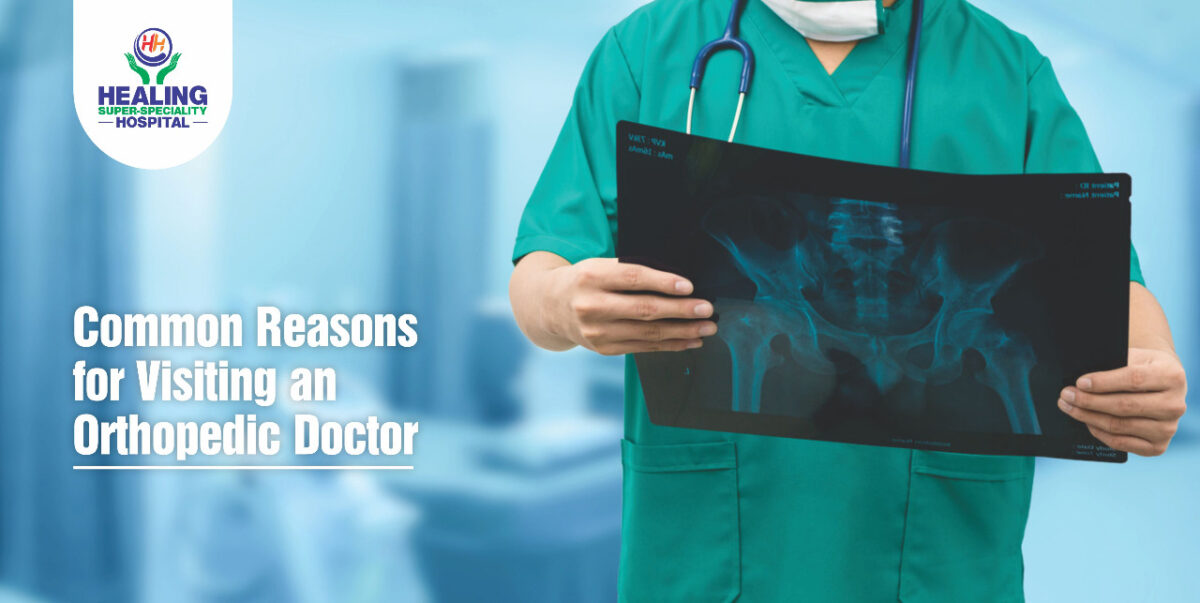An orthopedic doctor is a medical doctor who has additional years of training and experience in the prevention, diagnosis, and treatment of injuries related to the musculoskeletal system, in addition to their normal medical degree.
Some orthopedic doctors can treat all types of problems related to the musculoskeletal system, while others focus on specific body parts and specialize in fields such as sports medicine and pediatric orthopedics.
| Contents: -Bone fractures -Tendon injuries -SciaticaArthritis -Osteoporosis -Joint pain -Frozen shoulder -Plantar Fasciitis -Joint replacement -Restrictive motion |
Now that we know what an orthopedic doctor does, here are the common reasons for visiting an orthopedic doctor:

- Bone fractures: Fractures such as fractured kneecaps and broken wrists can necessitate the intervention of an orthopedic doctorin order to reset the bones and facilitate proper healing.
Fractures can occur in a joint, causing cartilage damage. Repairing this damaged cartilage can necessitate surgery. Sometimes, physiotherapy is also prescribed to help the joint function, to avoid stiffness and for quicker recovery.

- Tendon injuries: Tendons in your joints may be broken or strained in a variety of circumstances, such as car accidents, high-impact activities, or general physical activity. An orthopedic hospital in Mohali can help with any type of tendon injuries.
- Sciatica: Sciatica is a form of low back pain that radiates down the leg and into the foot. The most common cause behind it is slipped disc. In most cases, the pain will subside with time. However, if sciatica pain persists for more than six weeks, you should consult an orthopedic doctor.
- Arthritis: Osteoarthritis is characterized by severe joint pain, stiffness, and a restricted range of motion. The breaking down of the protective cartilage in one or more joints causes arthritis. Consulting an orthopedic doctor can help patients with such a problem.
- Osteoporosis: Osteoporosis is a disorder in which the bones become brittle and unstable due to tissue loss, which is usually caused by hormonal changes or a calcium or vitamin D deficiency.
Medication and lifestyle changes can be used to treat osteoporosis. Get answers to all your questions related to osteoporosis from the best orthopedic hospital in Chandigarh here: https://healinghospital.co.in/orthopedic/
- Joint pain: Pain may occur in any joint such as the knee, hip and shoulder. Factors such as extreme exercise and obesity can aggravate joint pain. It is important to get joint pain checked as joint injuries once left untreated may have long-term repercussions.
In the case of knee pain, it can occur in any part of the knee joint, kneecap, ligaments, tendons, and cartilage.
Hip pain refers to the discomfort felt in or near the hip joint. It may not always be felt in the hip, but rather also in the groin or the thigh.
Problems such as arthritis, dislocation and fracture can lead to shoulder pain, swelling, and reduced range of motion. It is also important to remember that sudden shoulder pain can also indicate a heart attack. If you feel such a kind of pain, call the emergency helpline number immediately.
Joint pain that lasts more than 2 to 4 weeks, or pain that includes swelling or discoloration, should be checked by an orthopedic doctor as soon as possible.
Also Read: https://healinghospital.co.in/orthopaedic-problems-in-childhood-best-ortho-doctor-in-chandigarh/
- Frozen shoulder: Frozen shoulder is a condition in which the shoulder gets stiff. The movement gets painful in such a case and one can find it difficult to lift the arms or move them. A specialist in orthopedics may diagnose frozen shoulder and recommend treatments such as gentle exercises, heat, medication or surgery.
- Plantar Fasciitis: Many people suffer from Plantar Fasciitis, which causes intense pain in the heel of the foot. An orthopedic doctor can treat this condition with a range of treatment options such as steroid injections, oral medications, physical therapy or surgery.
- Joint Replacement: Total joint replacement entails removing a portion or all of a damaged joint and replacing it with artificial implants. The most common joint replacements are hip and knee replacements, but replacement surgery may also be done for other joints.
- Restrictive Motion: A limited range of motion that isn’t caused by an apparent acute injury may be a sign of a more severe underlying health problem. An orthopedic doctor will conduct a thorough examination to identify the cause of your disability and help you get back to your normal motion.
If you experience pain in any of your joints, have injured a ligament, or have any other conditions such as above, book an appointment with the best orthopedic hospital in Chandigarh here: https://healinghospital.co.in/orthopedic/
























